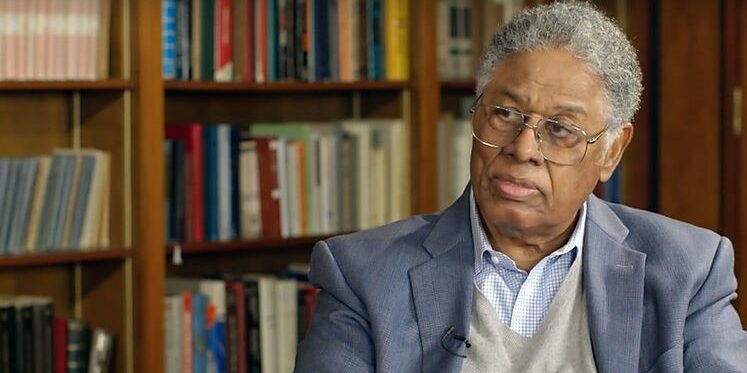Spock versus the Social Justice Warriors
Thomas Sowell’s current reputation as many conservatives’ favorite curmudgeonly economist and cultural critic may underplay his brilliance. His Basic Economics should be required reading in every survey econ course, and many consider his sociological work on race in America to be some of the best in that discipline (although sociology is the furthest left of any academic discipline and therefore ignores it). The trick to reading Sowell is to appreciate his vocation as the guy who won’t let us get away with sloppy, mono-causal explanations for complex social data. This is really important for generating the best solutions. What you will rarely get from Sowell is something we still do need: a way to face up to the cold, hard facts on policy without brushing off the seriousness of past injustice. While Sowell is right to point out that injustice is all too common in Social Justice Fallacies, I would argue that we must balance a proper historical contextualization of injustice with a correspondingly appropriate lament.
While there’s no shortage of Sowell’s usual obsession with data that leads to counter-intuitive conclusions, he’s also using that data to take a strong stand against genetics-obsessed right-wing racists. If data helps us remember that the lack of flourishing in our most destabilized communities has many causes, that lesson strikes home just as much against IQ as a monomaniacal explanation as it does against racism as a monomaniacal explanation.
He’s also emphasizing that the fallacies of ideologically captured claims of social justice must be rejected, both because they’re false, and because they’re so incredibly harmful to the very groups they hope to help. Sowell has a well-deserved reputation for impatience with his elite ideological enemies. Just because they talk a big game about social justice doesn’t mean that they’re particularly careful with their caring. It’s clear from Sowell’s latest work that he genuinely cares about people who get mowed down by perhaps well-intentioned but ultimately destructive policies and cultural attitudes. He wants to stop doing things that make their lives worse, and just because a particular policy approach glitters with empathy does not mean that it’s gold. What’s more, minority groups with a history of exclusion can make huge leaps forward if we could just embrace a few simple insights.
“Social justice” is a notoriously vague term. Early eighteenth-century Jesuit philosopher Luigi Tapparelli originally used the term to refer simply to a just social order reflected in a well-crafted constitution. But Sowell uses the term as it is understood more often these days, as referring to “an assumption that because economic and other disparities among human beings greatly exceed any differences in their innate capacities, these disparities are evidence or proof of the effects of such human vices as discrimination and exploitation.” Sowell is explicit that these vices have indeed played a role, but he also knows that they can’t possibly be the full explanation since so many oppressed minority groups have actually thrived economically, sometimes far beyond members of the majority culture. Considering that Sowell proffered an endorsement of Charles Murray’s exploration of genetic science and intelligence, one might think he’d join in the recent right-wing resurgence of genetic explanations. But no.
Just as Sowell uses his skill as a social scientist to poke holes in the Kendian view that all disparities result from racism, he uses his research into IQ to debunk that explanation for group disparities as well. Ready for some classic Sowellian data that leads to counter-intuitive conclusions? I was surprised to learn that first-born children tend to have significantly higher IQs than their siblings, presumably because of parental attention. Perhaps you are not aware that IQs, in general, have been changing drastically over the last century, as nutrition and medical care have improved. Most interesting (and relevant for the question of group disparities), all mountain peoples tend to have lower IQs than others, especially urban dwellers. Yep, you read that right. Sowell claims that this has to do with the social isolation of mountain life and could therefore also explain average lower IQs in groups that continue to experience more artificial forms of social isolation. Attachment theorists in psychology will resonate well with this explanation.
It is a shame that Sowell didn’t stop here to acknowledge some of the history that my co-author and I discuss in Black Liberation Through the Marketplace. Black Americans weren’t just isolated by Jim Crow, but also by overcriminalization and convict leasing, disemployment through the (eugenicist) minimum wage, urban renewal, highway construction, union exclusion, and the welfare state’s undermining of family structure. If there’s one clear picture we walked away with after researching for our book, it’s that destabilized neighborhoods with high poverty, high crime, and terrible education are the result of a string of wildly irresponsible and unjust federal policy that literally ghettoized poor Black citizens (and yes, poor whites were often affected by some of the same policies).
These neighborhoods are so isolating. They often split into four- to six-block areas in which gangs will protect their own but attack outsiders, so that one might not even feel safe walking through a nearby neighborhood. A job a few miles away takes a two-hour bus ride to get to (which means another two-hour ride back). Is it any surprise that we see lower IQ scores among fellow citizens when their groceries come from the convenience store (when they can get any); they may have addicted or imprisoned family members; they are often witnesses to traumatic, criminal events; and their schools are both mentally and physically dangerous?
Thomas Sowell’s ideas are absolutely essential for formulating social policy whose results match their goals.
Of course, there’s a genetic element to intelligence. As Sowell often jokingly says, “Half of the people have below-average intelligence.” Everyone is not magically naturally equal. But the idea that we should find racial theories of genetic intelligence interesting when IQ is so incredibly plastic and circumstances still vary so widely is frankly absurd. I was delighted that Sowell called it out, “especially after Murray’s latest book forwards a disturbingly deterministic account of Black intelligence. John McWhorter—a black heterodox scholar who bends over backwards to give Murray’s arguments a fair shake—still condemns Murray for thinking that “we need to accept an America in which black people are rarely encountered in jobs requiring serious smarts.” It’s one thing to defend letting scientists collect and present data, but quite another for them to dictate to us a baselessly hopeless future. Sowell’s careful suggestion of alternative causes for the current disparities inspires a far brighter vision of what could be accomplished in the next generation.
My only complaint about Sowell has always been that he’s such a rationalist type. He sometimes seems to be saying that if everyone could be more like him, and just adopt a Spock-like detachment and follow the data, we wouldn’t make such stupid decisions. For instance, it’s very important for all Americans, including Black ones, to know that slavery is a widespread institution, that ten times more slaves were brought to Brazil than to (what would become) the United States, and that some forms of slavery were so harsh that the slaves simply died. Yes, this is an incredibly important perspective, but it needs to be balanced with the kind of Adam Smithian sympathy that resonates with those with whom we are closest—namely, our own countrymen.
I’ll never forget going to the Smithsonian Museum of African American History and Culture, standing behind a Black mother with her children, hearing one of her children point out the population bubble for the Trans-Atlantic slave trade to Brazil, and overhearing her say, “That isn’t right; that can’t be right.” We have made the mistake of overplaying the uniqueness of the American slave experience (although the racialization of slavery, and the 100 years of white supremacy that followed it really are unique). All points well taken! But none of those points nullify the fact that we are Americans. This is our country and our history. Jim Crow affected our parents and grandparents, our neighbors. And we are the ones living with the consequences even to this day, as I described above. The fact that humans inflict pain on one another in every society doesn’t make it any less painful when it happens to you. The fact that slavery has been common, and even that ending slavery is the real outlier, doesn’t change the need for reckoning and reconciliation, particularly given all that followed.
Think of it this way (and I’m so sorry for the crude metaphor; all metaphors fail eventually, but hopefully this helps). If I am married to a man who abused me years ago and then stopped abusing me, it’s possible that we could begin to rebuild a relationship with one another. But if I’d like to, say, go to counseling to talk through our history of abuse, would it make any sense for him to say, “But why? Don’t you know that domestic abuse is quite common all over the world?” Yes, yes I know that. But you abused me and I need you to work through it with me if we are going to function well. So, no, I’ll need a little more than Spock-like detachment.
The rest of the book is what I might call Sowell’s greatest hits: the failure of redistribution schemes like the minimum wage, how stats are used and abused (as Mark Twain famously said, “there are lies, damned lies, and statistics”), and of course, his critique of the general intellectual hubris of all central planners. If you’ve read Sowell, you already know this stuff, but there are always fresh examples. If you haven’t read him, this is a short, readable introduction to those ideas. They are absolutely essential for formulating social policy whose results match their goals. These ideas are counter-intuitive enough that it’s quite a good idea to keep repeating them until they finally sink in.
And I truly appreciated that you could see a bit of Sowell’s heart coming through, his sense of the injustice that elites can repeat the same destructive mistakes endlessly and never have to answer for it. There’s a goodness in that kind of righteous anger because it moves us to action. I just hope that his conservative readers feel the love behind the justice. A critique of contemporary social justice is absolutely necessary, but not for dunks, or points, or mugs full of lib tears. We have to do it to love the poor well because we’re loving them with our minds as well as our hearts. Sowell considers it his job to point out the mistakes of the social justice left (and, apparently, the genetics-obsessed right, too). Let’s consider it our job to complement his work with the rhetoric of care, so that people with less than Spock-like detachment can see our hearts.


